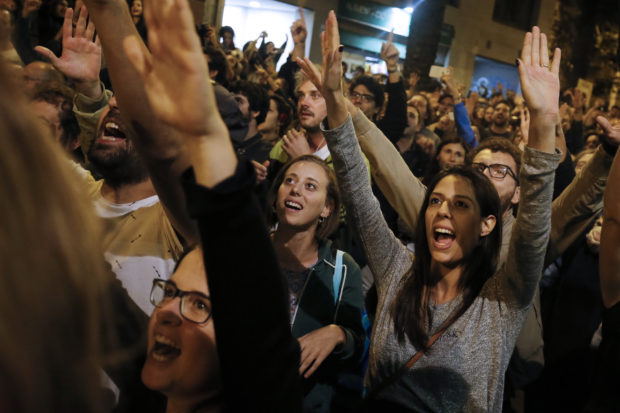Catalan leader threatens independence after chaotic vote

People celebrate after the closing of the ‘Espai Jove La Fontana’ (La Fontana youth center) polling station, on October 1, 2017 in Barcelona. Spanish riot police stormed voting stations today as they moved to stop Catalonia’s independence referendum after it was banned by the central government in Madrid. At least 92 people were confirmed injured as hundreds tried to prevent the polling stations from being closed, Catalan officials said. A total of 465 people were treated at hospitals and health centres, while Spain’s interior ministry said 12 police officers were injured. AFP
Catalonia’s overwhelming vote for independence looked set to increase tensions between Madrid and the powerful region after a defiant referendum marred by violence.
With 90 percent of voters backing independence Sunday, regional leader Carles Puigdemont said they had “won the right to an independent state”.
Puigdemont has said that in the event of a “Yes” victory he would declare independence for Catalonia, which accounts for 19 percent of Spain’s GDP.
He urged the European Union to stop looking “the other way” following a major police crackdown on the ballot which Madrid had declared illegal.
At least 92 people were confirmed injured out of a total of 844 who needed medical attention, Catalan authorities said.
Article continues after this advertisementHelmeted police armed with batons moved in en masse early Sunday to seal off polling stations and seize ballot boxes, sparking clashes.
Article continues after this advertisementVideos posted on social media showed police dragging voters from polling stations by their hair, throwing people down stairs and attacking Catalan firefighters who were protecting polling stations.
The interior ministry said 33 police required treatment as a result of the clashes.
Spanish Prime Minister Mariano Rajoy declared the plebiscite had been blocked, saying “today there has not been a self-determination referendum in Catalonia,” a region deeply divided over independence.
Rajoy called the vote a process that “only served to sow division, push citizens to confrontation and the streets to revolt”, but left the door potentially open to negotiations on greater autonomy for the region.
The violence raised alarm abroad and further heightened divisions between Rajoy’s government and the authorities in Catalonia in the worst political crisis in Spain in decades.
Further adding to tensions, unions and Catalan associations called a region-wide strike for Tuesday due to “the grave violation of rights and freedoms,” urging people to take to the streets in Catalonia.
The referendum was organized under the threat of reprisals and criminal charges but thousands of Catalans stood in defiance of the central government crying “Votarem” — “We will vote”.
Puigdemont, who governs Catalonia, said in an address after polls closed: “With this day of hope and suffering, the citizens of Catalonia have won the right to an independent state in the form of a republic.”
Regional government spokesman Jordi Turull said 2.26 million took part, with 2.02 million voting for independence, or 90 percent. Turnout was 42.3 percent.
Camped inside overnight
The referendum law foresees a declaration of independence soon after a “Yes” vote but it remains unclear if the regional government will actually do so.
Even before the vote, judicial officials ordered police to seize ballot papers, detain key organisers and shut down websites promoting the referendum after Madrid and the courts deemed it unconstitutional.
Thousands of people had gathered outside polling stations before dawn, joining those who had spent the night camped inside to ensure they would be open on the day.
In central Barcelona, riot police charged at demonstrators who were sitting on the ground at a polling station, and fired rubber bullets, witnesses said.
‘Unjustified violence’
Riot police also stormed a polling station near Girona, smashing the glass doors of the sports centre where Puigdemont was due to vote and cutting a chain to force their way in.
But the regional government said Puigdemont had managed to vote anyway in nearby Cornella del Terri.
The crackdown drew a sharp rebuke from Catalan leaders and others including Nicola Sturgeon, leader of the pro-independence Scottish National Party.
The trouble caused Barcelona football club to play its La Liga tie against Las Palmas behind closed doors after the Spanish league refused to postpone the match.
But in several areas, voting was peaceful.
Under a sea of umbrellas outside a school in Barcelona, a crowd gathered, among them elderly people in wheelchairs, families with buggies and parents clutching toddlers by the hand.
With no police in sight, they were able to cast their ballots, prompting scenes of jubilation.
“I’ve voted! I’ve voted,” one man shouted.
“That’s the great hope, to be able to vote freely like this despite the problems we’ve faced, I’m very happy. I can die peacefully,” added Jose Mas Ribas, 79.
Although Catalans are divided over independence, most want to vote on the matter in a legal and binding plebiscite.
Catalonia already has significant control over education, healthcare and welfare, but the region says it pays more in taxes than it receives from Madrid.
This has sparked resentment which has been further exacerbated by Spain’s economic woes and helped push the secessionist cause.